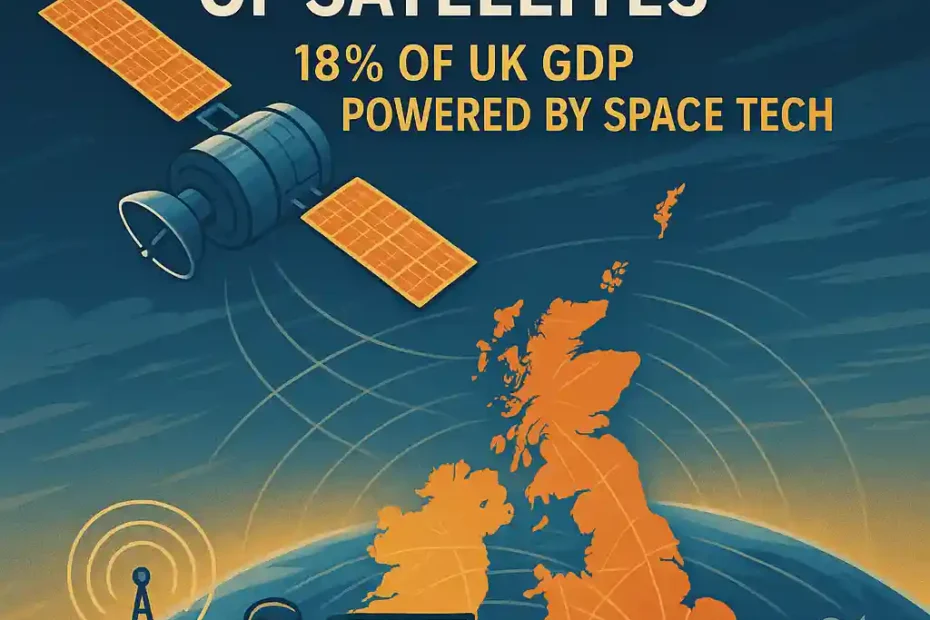How Satellite Services Contribute 18% to the UK’s GDP
The UK is entering a new era of economic transformation, with satellite technologies playing a pivotal role across multiple sectors. According to recent research from the UK Space Agency, satellite services now support industries contributing to 18% of the UK’s GDP. This remarkable figure positions the nation as a key player in the global space economy. In this article, we explore the significance, implications, and future potential of satellite technology within the UK.
Background and Context
While the UK’s use of satellite services isn’t new, the scale of integration across sectors is rapidly expanding. These services range from GPS navigation and weather forecasting to remote sensing and telecommunications—functions critical to industries like agriculture, transportation, finance, and energy.
In 2021, the UK Space Agency launched a bold strategy to double the size of the domestic space sector to £40 billion by 2030. This aligns with recent findings that satellites now underpin almost a fifth of the national economy, driven by a surge in innovation, government backing, and private investment.
Implications for the UK Economy
This development has far-reaching implications for policymakers, investors, and industry leaders:
- Digital transformation: More sectors are integrating satellite data into operations for increased efficiency, precision, and global reach.
- Job creation: There’s a growing demand for professionals in space-related fields—from data analysts to satellite engineers—boosting STEM employment opportunities.
- Global competitiveness: The UK’s satellite capabilities can attract international partnerships and position the country as a leader in space innovation.
Industry Reactions
Industry experts have welcomed the findings with optimism. Dr. Tom Watts, CEO of a leading satellite firm, noted: “This statistic is a clear indication that we are making strides toward becoming a global space leader. The economic opportunities driven by satellite services extend well beyond aerospace, impacting agriculture, climate monitoring, and energy efficiency.”
This sentiment is sparking innovation, encouraging start-ups and legacy companies to explore new satellite-driven solutions.
Future Outlook and Opportunities
Looking ahead, the satellite industry in the UK appears poised for further growth. Key developments on the horizon include:
- Miniaturized satellites: The rise of small satellite constellations could reduce costs and accelerate data collection.
- Mega-constellations: Large-scale projects will increase connectivity in rural and underserved areas.
- Public-private partnerships: Greater collaboration will help fast-track innovation and attract global talent.
Continued investment in R&D, infrastructure, and education will be essential to sustaining momentum and maximizing returns from this expanding sector.
Conclusion
The discovery that satellite services support 18% of the UK’s GDP underscores the strategic value of space technology in national development. As industries embrace digital infrastructure, satellites will remain central to data-driven decision-making, innovation, and global competitiveness. For businesses, governments, and citizens, understanding and leveraging these advancements will be key to sustainable growth in the years to come.
Frequently Asked Questions
Why is this news important?
It highlights the growing importance of satellite technology in the UK economy and its transformative impact on multiple industries.
What are the key implications of this development?
Implications include job creation, increased tech investment, a boost in international competitiveness, and the growing influence of space services on national infrastructure.
How does this affect industries and the public?
Industries benefit through improved logistics, forecasting, and monitoring, while the public experiences better connectivity, safety, and access to services.
What is the historical context behind this growth?
The UK has been investing in space for decades, with the 2021 UK Space Strategy aiming to double sector revenue by 2030. Recent innovations and demand have accelerated growth.
What are experts saying?
Experts see this as a validation of ongoing investment and a call to further strengthen the UK’s role in global space leadership.
What future outcomes are expected?
Potential outcomes include expanded satellite networks, enhanced rural broadband access, smarter city planning, and increased exports of space services.
How should businesses or readers respond?
Businesses should assess how satellite technology can improve efficiency, and readers should stay informed about how space innovation shapes policy, economy, and daily life.
